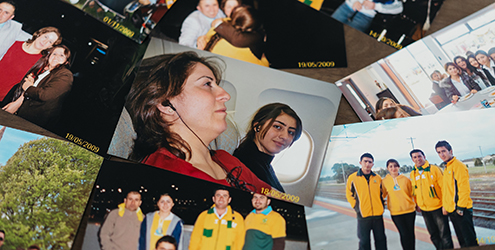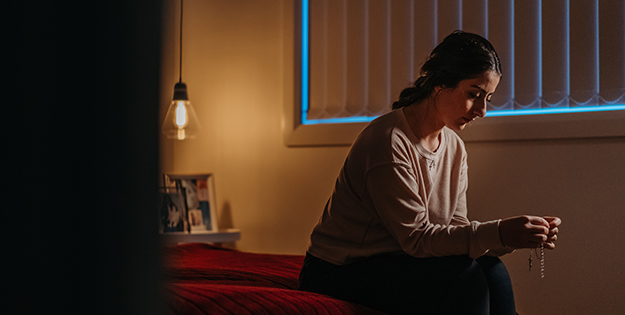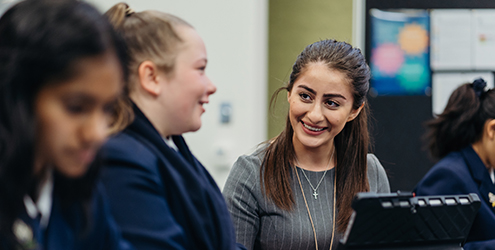Global
Copyright@ Australian Catholic University 1998-2026 | ABN 15 050 192 660 CRICOS registered provider: 00004G | PRV12008
Copyright@ Australian Catholic University 1998-2026 | ABN 15 050 192 660 CRICOS registered provider: 00004G | PRV12008
Shamiran Merkhaal arrived in Australia as a refugee with only a few words of English. A decade later, she teaches low socio-economic youth in Melbourne’s western suburbs.
“I felt like an outsider,” said Iraqi refugee Shamiran Merkhaal, when asked about her arrival in Australia on a humanitarian visa in 2009 — a week shy of her 14th birthday.
Along with her parents and two older brothers, Shamiran fled war-torn Baghdad in 2004 and spent half a decade in Jordan — “a painful, five-year journey” —while awaiting the approval of their Australian visas.
Finally, after several failed application attempts, the Merkhaals got news they would be reunited with relatives who had fled Iraq and settled in Melbourne years earlier.
“I was so excited, but when we finally got here it was actually very isolating,” said Shamiran, now 23
“We would be in family gatherings and my cousins were all speaking in English, and I just felt out of place. It might not sound like a big thing, but it really hurt at the time, and that feeling still comes back when I see them.”
As a Chaldean Catholic, Shamiran’s native language is a form of Aramaic, but she had learnt bits of English while at school in Jordan.
“I knew the alphabet and numbers but that was basically it,” she said. “I would try to imagine what it would be like to have a conversation in English, but back then, I would never in a million years have imagined I would one day be fluent.”
Learning to read and write was Shamiran’s gateway to acceptance in Australia.
While in school at Kolbe Catholic College in Greenvale, a suburb of Melbourne that is popular with Chaldeans, she steered herself to a culturally diverse group of friends, “so I would be forced to speak English.

“I pushed myself out of my comfort zone and made friends from all around the world, and even now, we still hang out,” Shamiran said.
“These are the small decisions I made to ensure that I would learn to speak the language well, but also to secure a better tomorrow for myself.”
The Merkhaals were lucky. They escaped Iraq before the persecution of Christians intensified in the majority-Muslim nation.
“It was just after the start of the war when we left, so the violence against our people was happening, but it was nowhere near as severe as it was say five or six years ago,” Shamiran said.
In recent years, the persecution of Iraq’s Christian minorities by Islamic State and other jihadist groups has been labelled as “genocide”. Chaldean Catholics were given an ultimatum to “convert, flee or die”, with many leaving Iraq to resettle in countries like Australia — now home to at least 20,000 Chaldeans.
While most of Shamiran’s extended family had fled Iraq by 2004, her father, a successful businessman, was hesitant to leave Baghdad. He changed his mind when the practice of demanding fasil, or blood money, increased.
“The fact that we were Catholics made us an easier target, and that was the turning point for my dad. That's when he decided to leave everything behind and go to a place where we would not be targeted, where we could believe what we believe without being persecuted.”
For her part, Shamiran remembers little of her childhood in Iraq.
“Maybe it's a coping mechanism, maybe it's just me not having the greatest memory, but honestly I only remember bits and pieces,” she said.
In Jordan, the Merkhaal family’s faith was strengthened. Shamiran’s father worked for Mother Teresa’s Missionaries of Charity in Amman, and they attended church services almost every day.

“When you face difficulties and go through a hard time, religion is your only option and God is your only saviour, and so it was in Jordan that we became really close to the Church,” she said.
“It was hard to be in a place where we had no family. What kept us sane was praying and having faith and knowing that everything happens for a reason, and even if we had to wait a bit longer, eventually we would be accepted and find a new home in Australia.”
Things started to fall into place for Shamiran in her final years of high school.
She was studying hard and developing a love for her new homeland, where people could “do what they want and not be judged”.
“I loved everything about Australia, all the freedoms and opportunities that we have here,” she said, adding that she experienced mild culture shock at the fact that girls could wear short dresses and skirts.
“I’m not joking — I didn't even know that was a thing,” Shamiran said. “We may be Catholics but we grew up in a predominantly Muslim country, and while we would never judge people for wearing any type of clothing, we were influenced by that mentality.”
She was also grappling with differing views on women’s education. Since the 2003 invasion, the literacy rate amongst girls in Iraq has been in decline, and for many women, going to university is not an option.
“It’s more likely that you get married at 18, have a few kids and you’re on your merry way as a ‘happy housewife’,” Shamiran said.

Shamiran is a passionate teacher.
She toyed with the idea of becoming an interior designer, but in her final year of school resolved to study to become a teacher.
“The longer I was here, the more I realised I could do anything I wanted, and finally I thought, ‘I would love to be a teacher who could make a difference to a student's life, even if it’s just making one day of their life better’.”
Once enrolled at ACU’s Melbourne Campus, Shamiran put her “heart and soul” into learning to become a teacher. She knew she was at a disadvantage to many of her classmates from privileged backgrounds, “with parents who were doctors and lawyers and whatnot”.
“That put them 10 steps ahead of me,” she said. “I couldn’t waste time partying, going to festivals and getting drunk and turning up to lectures hung over. That wasn’t an option. I had no time to waste.”
Shamiran graduated with a Bachelor of Education in September 2018 and was employed by a school in a low socioeconomic area through ACU’s Catholic Teacher Education Consortium.
“I see a lot of similarities between these kids and myself when I arrived 10 years ago, especially those from a refugee or immigrant background, so there's a lot of empathy there and an awareness that you never know what these kids have gone through,” she said.

Shamiran’s greatest hope is to give her students the guidance and support she received from some of her teachers, who armed her with the tools she needed to thrive.
She still has to pinch herself when she realises how far she’s come.
“Sometimes I walk down the street and I need to take a moment to realise I am physically living here,” Shamiran said.
“I am not dreaming, I'm not seeing this on a TV screen. I'm honestly, legitimately living in Australia, and this my life now.”
Want to study teaching at ACU? Explore your options.
Copyright@ Australian Catholic University 1998-2026 | ABN 15 050 192 660 CRICOS registered provider: 00004G | PRV12008